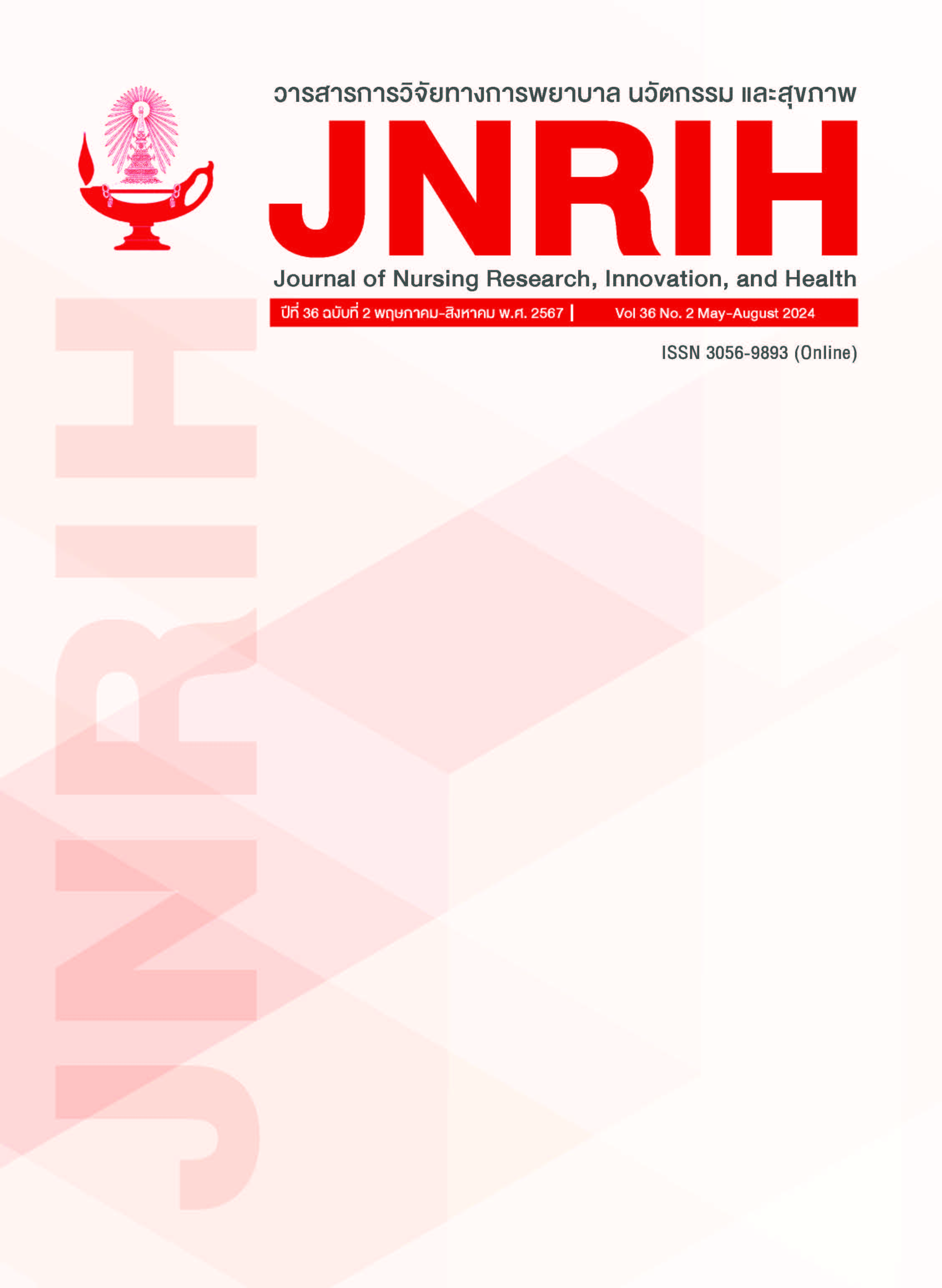ปัจจัยทำนายคุณภาพชีวิตด้านสุขภาพของผู้ป่วยบาดเจ็บศีรษะ
คำสำคัญ:
คุณภาพชีวิตด้านสุขภาพ, บาดเจ็บศีรษะ, ปัจจัยทำนายบทคัดย่อ
วัตถุประสงค์การวิจัย: เพื่อศึกษาปัจจัยทำนายคุณภาพชีวิตด้านสุขภาพของผู้ป่วยบาดเจ็บศีรษะ
รูปแบบการวิจัย: การวิจัยเชิงทำนาย
วิธีดำเนินการวิจัย: กลุ่มตัวอย่าง คือ ผู้ป่วยบาดเจ็บศีรษะ จำนวน 110 คน เครื่องมือวิจัย คือ แบบสอบถามข้อมูลส่วนบุคคล แบบสอบถามความสามารถในการฟื้นพลัง แบบสอบถามการเผชิญปัญหา แบบสอบถามกลุ่มอาการภายหลังสมองได้รับการกระทบกระเทือน แบบประเมินความสามารถในการทำหน้าที่ แบบสอบถามคุณภาพชีวิตด้านสุขภาพของผู้ป่วยบาดเจ็บศีรษะ และแบบสอบถามคุณภาพชีวิตแบบทั่วไป ค่าสัมประสิทธิ์แอลฟาของครอนบาค เท่ากับ .93, .92, .87, .88, และ .96 ตามลำดับ วิเคราะห์ข้อมูลโดยใช้สถิติวิเคราะห์ถดถอยพหุคูณ
ผลการศึกษา: 1) คุณภาพชีวิตด้านสุขภาพของผู้ป่วยบาดเจ็บศีรษะและคุณภาพชีวิตแบบทั่วไป อยู่ในระดับปานกลาง (= 63.1, SD = 10.3 และ = 61.3, SD = 19.3 ตามลำดับ) 2) ปัจจัยที่สามารถร่วมกันทำนายคุณภาพชีวิตด้านสุขภาพของผู้ป่วยบาดเจ็บศีรษะได้อย่างมีนัยสำคัญทางสถิติที่ระดับ .05 เมื่อประเมินด้วยแบบสอบถาม QOLIBRI คือ การเผชิญปัญหา และความสามารถในการฟื้นพลัง โดยมีอำนาจการทำนาย
ร้อยละ 18.8 และปัจจัยกลุ่มอาการภายหลังสมองได้รับการกระทบกระเทือน ความสามารถในการฟื้นพลัง และระยะเวลาการบาดเจ็บ มีอำนาจการทำนายร้อยละ 41.4 เมื่อประเมินด้วยแบบสอบถาม SF-36V2
สรุป: ผลการศึกษานี้สามารถนำข้อมูลไปใช้เป็นแนวทางในการพัฒนาโปรแกรมการพยาบาล เพื่อเพิ่มคุณภาพชีวิตด้านสุขภาพของผู้ป่วยบาดเจ็บศีรษะได้ โดยปัจจัยกลุ่มอาการภายหลังสมองได้รับการกระทบกระเทือนเป็นปัจจัยที่มีอำนาจการทำนายสูงสุด จึงควรเป็นตัวแปรแรกที่ควรนำมาพัฒนาโปรแกรมการพยาบาลจัดการกับกลุ่มอาการดังกล่าว เพื่อเพิ่มคุณภาพชีวิตด้านสุขภาพของผู้ป่วยบาดเจ็บศีรษะ
เอกสารอ้างอิง
Costello RS, Downing MG, Ponsford J. The experience of traumatic brain injury in a culturally and linguistically diverse sample in Australia. Disabil Rehabil [Internet]. 2024 May 16 [cited 2024 Jun 29];46(10): 2069-2078. Available from: https://www.tandfonline. com/doi/full/10.1080/09638288.2023.2216473 doi: 10.1080/09638 288.2023.2216473
Rauen K, Reichelt L, Probst P, Schäpers B, Müller F, Jahn K, Plesnila N. Quality of life up to 10 years after traumatic brain injury: A cross-sectional analysis. Health Qual Life Outcomes [Internet]. 2020 Jun 4 [cited 2024 Jun 29];18(1): 166-77. Available from: https://pubmed.ncbi.nlm.nih.gov/32498679/ doi: 10.1186/s12955-020-01391-3 PubMed PMID: 32498679 PMCID: PMC7271485.
Ponjaras S, Hirunchunha S, Phonphet C. Headache and dizziness, symptom management, and quality of life of patients with mild traumatic brain injury. JRN-MHS [Internet]. 2018 Sep. 30 [cited 2024 Jun 2];38(3):65-78. Available from: https://he02.tci-thaijo.org/index.php/nur-psu/article/view/148301 (In Thai).
Theankaew K, Samartkit N, Masingboon K. Relationships between headache, sleep disturbance, fatigue and quality of life in patients with mild traumatic brain injury at 3 months after the trauma. J Nurs Health Care [Internet]. 2019 Dec. 27 [cite 2024 Jun 2];37(4):157-66. Available from: https://he01.tci-thaijo.org/index.php/jnat-ned/article/ view/233702/160613 (In Thai).
Forslund MV, Perrin PB, Sigurdardottir S, Howe EI, van Walsem MR, Arango-Lasprilla JC, et al. Health-related quality of life trajectories across 10 years after moderate to severe traumatic brain injury in Norway. J Clin Med [Internet]. 2021 Jan 5 [cited Jun 29];10(1):157-70. Available from: https://pubmed.ncbi.nlm.nih.gov/33466321/ doi: 10.3390/jcm10010157 PubMed PMID: 33466321 PMCID” PMC7794850.
Nipathakusolkit P, Nimitphan P, Songwathana P. Factors related to quality of life among traumatic brain injury patients after discharged. Songklanagarind J Nurs [Internet]. 2015 Apr 21 [cited 2024 Jun 2];35(1):135-52. Available from: https://he02.tci-thaijo.org/ index.php/nur-psu/article/view/33104 (In Thai).
Puengching T. Predicting factors of health related quality of life among traumatic brain injury survivors [dissertations]. Bangkok: Chulalongkorn University; 2015. 180 p. (In Thai).
Arundon K, Songwathana P, Anumas N, Rattichot C, Sawatdinarunart S, Cheevarungrod A. Factors influencing health related quality of life in traumatic brain injury patients after discharged from a tertiary hospital. pnujr [Internet]. 2016 Aug 27 [2024 Jun 2];8(3):1-13. Available from: https://www.nur.psu.ac.th/researchdb/file_warasarn/ 15415journal2.pdf (In Thai).
Songwathana P, Kitrungrote L, Anumas N, Nimitpan P. Predictive factors for health-related quality of life among Thai traumatic brain injury patients. J Beh Sci [Internet]. 2018 Jan. 31 [cited 2024 Jun 2];13(1):82-9. Available from: https://www.nur.psu.ac.th/ researchdb/file_warasarn/14254journal2.pdf
Vos L, Poritz JMP, Ngan E, Leon-Novelo L, Sherer M. The relationship between resilience, emotional distress, and community participation outcomes following traumatic brain injury. Brain Inj [Internet]. 2019 [cited 2024 Jun 29];33(13-14):1615-23. Available from: https://pubmed.ncbi.nlm.nih.gov/ 31456432/ doi: 10.1080/02699052. 2019.1658132 PubMed PMID: 31456432.
Rapport LJ, Wong CG, Hanks RA. Resilience and well-being after traumatic brain injury. Disabil Rehabil [Internet]. 2019 Jun 3 [cited 2024 Jun 29];42(14):2049-55. Available from: https://www.tandfonline.com/doi/full/10.1080/09638288.2018.1552327 doi: 10.1080/ 09638288.2018.1552327
Assonov D. Correlates and predictors of resilience in veterans with persistent traumatic brain injury symptoms. Postep Psychiatr Neurol [Internet]. 2022 Oct 24 [cited 2024 Jun 29];31(3):103-13. Available from: https://pubmed.ncbi.nlm.nih.gov/37082223/ doi: 10.5114/ppn.2022.120600 PubMed PMID: 37082223 PMCID: PMC9946368.
Nelson LD, Temkin NR, Barber J, Brett BL, Okonkwo DO, McCrea MA, et al. Functional recovery, symptoms, and quality of life 1 to 5 years after traumatic brain injury. JAMA Netw Open. 2023 Mar 1 [cited 2024 Jun 29];6(3):e233660. Available from: https://pubmed.ncbi.nlm.nih.gov/36939699/ doi: 10.1001/jamanetworkopen.2023.3660 PubMed PMID: 36939699 PMCID: PMC10028488.
Verdugo MA, Fernandez M, Gomez LE, Amor AM, Aza A. Predictive factors of quality of life in acquired brain injury. Int J Clin Health Psychol [Internet]. 2019 Sep 19 [cited 2024 Jun 29];19(3):189-97. Available from: https://pubmed.ncbi.nlm.nih.gov/31516497/ doi: 10.1016/j.ijchp.2019.06.004 PubMed PMID: 31516497 PMCID: PMC6732774.
Voormolen DC, Polinder S, von Steinbuechel N, Vos PE, Cnossen MC, Haagsma JA. The association between post-concussion symptoms and health-related quality of life in patients with mild traumatic brain injury. Injury [Internet]. 2019 May;50(5):1068-74. Available from: https://pubmed.ncbi.nlm.nih.gov/30554897/ doi: 10.1016/j.injury.2018. 12.002 PubMed PMID: 30554897.
Ware JE Jr, Sherbourne CD. The MOS 36-item short-form health survey (SF-36). I. conceptual framework and item selection. Med Care [Internet]. 1992 Jun;30(6):473-83. Available from: https://pubmed.ncbi.nlm.nih.gov/ 1593914/ PubMed PMID: 1593914.
Connor KM, Davidson JR. Development of a new resilience scale: the Connor-Davidson Resilience Scale (CD-RISC). Depress Anxiety [Internet]. 2003;18(2): 76-82. Available from: https://pubmed.ncbi.nlm.nih.gov/12964174/ doi: 10.1002/da.10113 PubMed PMID: 12964174.
Mingkwan P. Stress and coping in the elderly stroke patients [dissertations]. Chiangmai: Chiangmai University; 1999. (In Thai).
Premsai T. Follow up study of patients’ adaptation after mild head injury [dissertations]. Bangkok: Mahidol University; 2003. (In Thai).
Arsanok A. Selected factors related to quality of life in adult patients with brain tumor [dissertations]. Bangkok: Chulalongkorn University; 2006. 182 p. (In Thai).
Jirarattanaphochai K, Jung S, Sumananont C, Saengnipanthkul S. Reliability of the medical outcomes study short-form survey version 2.0 (Thai version) for the evaluation of low back pain patients. J Med Assoc Thai [Internet]. 2005 Oct [cited 2024 Jun 2];88(10): 1355-61. Available from: https://pubmed.ncbi.nlm.nih.gov/16519379/ PMID: 16519379.
ดาวน์โหลด
เผยแพร่แล้ว
ฉบับ
ประเภทบทความ
สัญญาอนุญาต
ลิขสิทธิ์ (c) 2024 วารสารการวิจัยทางการพยาบาล นวัตกรรม และสุขภาพ

อนุญาตภายใต้เงื่อนไข Creative Commons Attribution-NonCommercial-NoDerivatives 4.0 International License.
##default.contextSettings.thaijo.licenseTerms##


